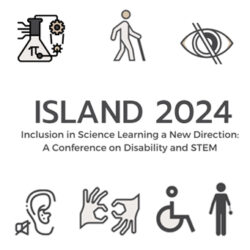Presenter
Dr. Annmarie Ross
Rochester Institute of Technology/ National Technical Institute for the Deaf (RIT/NTID)
Abstract
Interventions in education settings are needed to grow the membership of underrepresented chemists who are Deaf and Hard-of-Hearing (DHH). Such interventions are necessary to improve the educational experience and support of students who are DHH. Resources, such as assistive technologies, as well as collections of best practices and educational design features for implementation in the chemistry classroom and laboratory settings are available to educators for improving the chemistry education for learners who are DHH. Conveniently, educators often find that these implementations for students who are DHH also benefit other students in the learning environment. The brand-new edition of the book, Teaching Chemistry to Students with Disabilities, shares such resources and best practices and specific strategies/resources therein for learners who are DHH. With implementation of the shared best practices and accommodations, students who are DHH can be very successful in the chemistry classroom.
